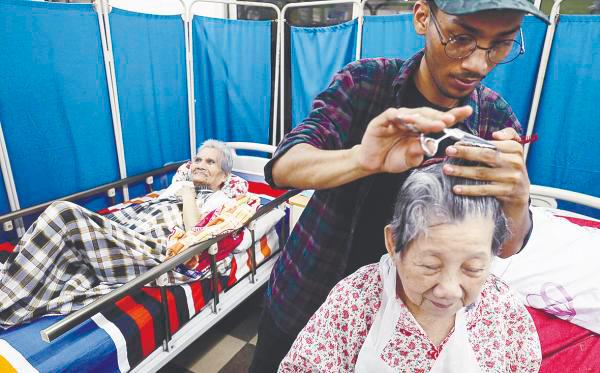PETALING JAYA: The government needs to open more welfare homes for the elderly who have suffered abuse and neglect at the hands of their families, said lawyer Kokila Vaani Vadiveloo.
She said there is an urgent need for robust legal protection and support systems to safeguard vulnerable senior adults from such harm.
“Legislating new laws is imperative to providing greater protection and rights for the elderly to curb abuse and neglect. The proposed Senior Citizen’s Bill, which is slated for introduction this year, is intended to address these concerns.
“However, the specifics of the Bill have not been disclosed. It is crucial for Parliament to not just focus on preventing abuse and neglect but also include provisions for filial support and maintenance.“
READ MORE: Govt boosting efforts to meet ageing society needs
Kokila said the National Health and Morbidity Survey published in 2020 found that 9% of elderly persons in Malaysia, or one in 11 out of 2.5 million senior citizens, have been abused, with neglect being the most prevalent.
“The survey also found that there were some 1,400 private retirement homes nationwide but of these, 1,300 are illegal.
“Even licensed facilities receive inadequate funding from the Social Welfare Department and are forced to depend on public donations.”
She said upon reviewing the department’s official website, there is a relatively limited number of old folk homes listed, with only 401 registered facilities under its jurisdiction.
Kokila also said Malaysia is expected to become an ageing nation by 2035, with 15% of the total population aged 60 and above,adding that this demographic shift may lead to an imbalance in the national ecosystem and negatively impact the economy, healthcare and welfare systems.
“Consequently, the need for the government to legislate specific laws to protect the elderly has become critical. This legislation should be rigorously supported and implemented to address the abuse and neglect faced by them.”
In January, the Health Ministry released a report indicating a 20% rise in cases of abuse and neglect of parents by their family members.
Kokila said the statistics indicate a distressing reality faced by senior citizens as it sheds light on the need for greater awareness, support and protection mechanisms to safeguard them.
To understand the situation further, theSun approached Rumah Kasih Hospital Kuala Lumpur, a subsidiary service run by the Kuala Lumpur Hospital.
Its manager Foong Peng Lam said since its establishment in September 2000, Rumah Kasih has provided shelter to over 700 elderly individuals who are terminally ill.
“These people were abandoned by family members or relatives who were unwilling to take them home from the hospital.
“Some of the elderly were also abandoned as they were perceived as being ‘worthless’. Tragically, they found themselves on the streets and faced the harsh conditions of malnutrition, sickness and hunger.
“When found and hospitalised, they choose to remain in the hospital rather than return to the streets,” he said, adding that that is how most of them ended up at Rumah Kasih.
Foong said despite the care that Rumah Kasih provides, it faces numerous challenges as government welfare homes are usually full and have long waiting lists for admission.
“This situation leads to congestion in hospital wards, as patients who should be discharged remain due to the lack of alternative care options.
“Some individuals even refuse to care for their elderly parents, and prioritise their enjoyment over family obligations.”
He said there is also a troubling trend of family members providing fake addresses and contact information to avoid responsibility for their sick relatives.
Foong said Rumah Kasih bears the brunt of this problem, with a growing number of abandoned patients needing shelter and care.
“It is clear that solutions are needed to address the underlying issues of homelessness, elderly neglect and inadequate social support systems to alleviate the strain on hospitals and provide dignified care to those in need.”









